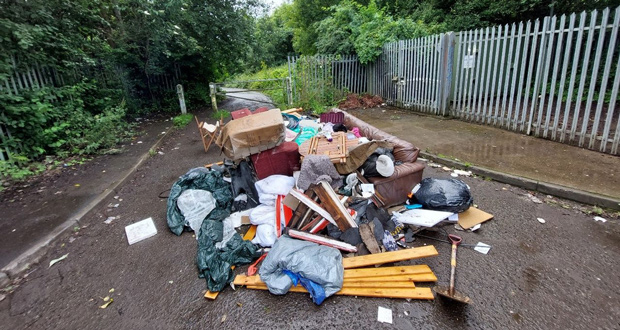Environmental charity Keep Britain Tidy is calling for urgent action to clamp down on rogue waste operators and strengthen enforcement on waste crime as new research among local authorities reveals fly-tipping incidents are rising and councils are increasingly frustrated by the scale of the problem.
To inform its new ‘Fight Fly-tipping Fortnight’ campaign, Keep Britain Tidy carried out research among local authorities, revealing that:
- 98 per cent say fly-tipping is a problem in their area, with almost three quarters (70 per cent) reporting a ‘major problem’.
- Almost all (96 per cent) are frustrated with the increasing severity of the issue. More than half (56 per cent) report that incidents have increased in the past year and 54 per cent feel that they won’t ever get on top of the problem.
- Two in five (40 per cent) fly-tipping incidents are now reported to be left by rogue ‘white van’ operators rather than individuals – showing how profit-driven waste crime has become a significant contributor to the problem.
Nationally, more than 1.15 million fly-tipping incidents were reported in 2023-24 by councils. With estimated costs to landowners and council tax-payers ranging from £100 million to £150 million for clearance and investigation, fly-tipping diverts funding away from vital services like schools, social care and parks.
Keep Britain Tidy is calling for coordinated national action with a new Fly-tipping Action Plan recommending a series of measures including:
- Smarter prevention: facilitating the legitimate disposal of goods; stricter permitting and easier recognition for waste carriers, improved education for householders and increased responsibility on companies to collect, reuse and recycle commonly fly-tipped goods.
- Tougher enforcement: ensuring local authorities are better equipped to catch waste criminals; introducing stronger penalties and deterrents including higher fines, points on driving licences and crushing of vehicles used by criminals.
The survey revealed overwhelming support among local authorities for licensing and enforcement reforms to reduce fly-tipping. According to the research:
- 86 per cent agree that providing legitimate waste carriers with a physical, easily recognisable permit would help reduce incidents of fly-tipping.
- 95 per cent agree that making it mandatory for waste carriers to display their permit number on vehicles used to transport waste would help to cut fly-tipping.
- 86 per cent say that the introduction of a mandatory, free Extended Producer Responsibility schemes for commonly fly-tipped items such as mattresses and sofas would reduce the number of large household items that are fly-tipped.
- 94 per cent agree that developing a platform to share intelligence relating to suspected illegal waste carriers would help reduce incidents.
- 95 per cent agree that ensuring fines handed down by magistrates’ courts are at least as high as a fixed penalty notice for fly-tipping would deter fly-tippers.
- 83 per cent say a national awareness campaign to educate residents on their duty of care for their own rubbish would cut the number of fly-tipping incidents.
Dr. Anna Scott, Director of Services at Keep Britain Tidy, said: ““Fly-tipping is not a victimless crime nor is it petty offending, it is organised crime that undermines responsible businesses, damages our environment and erodes public trust. To turn the tide, we need tougher penalties to deter offenders, a robust permitting system so rogue operators can’t hide in plain sight and measures that make it easier for people to dispose of waste legally and responsibly.
The key measures set out in Keep Britain Tidy’s Fly-tipping Action Plan are:
Shut down rogue operators with tougher permitting
- Physical waste carrier permits should be clearly marked with the business name and permit number, and be easily recognisable and difficult to forge.
- Vehicles used to collect waste should display their permit number clearly, making it easier for householders and authorities to spot illegitimate operators.
- The Environment Agency’s register should aim to become an essential tool for householders looking for a legitimate, local domestic waste removal service.
Raise public awareness
- Recognising the need for a national drive to educate the public around their duty of care and how to dispose of their waste responsibly, Keep Britain Tidy is launching a new campaign with local authorities under the banner of Fight Fly-tipping Fortnight in November 2025 and is encouraging all local authorities in England to support it.
Cut the criminals off at source – create a circular economy for bulky waste
- Introduce a mandatory, free take-back scheme for commonly fly-tipped bulky items like mattresses, white goods and furniture through an Extended Producer Responsibility scheme.
Join the dots to help local authorities tackle the problem
- Identifying an appropriate agency to centralise intelligence and data-sharing between local authorities and enforcement bodies.
Strengthen enforcement and penalties
- The Sentencing Council for England and Wales should recommend that fines for waste crimes are at least as high as the Fixed Penalty Notices offered to those accused of waste crime in lieu of prosecution.
- On top of Defra’s commitment to make it easier for local authorities to confiscate and crush vehicles used to carry out fly-tipping, introduce other deterrents such as banning those found guilty of breaking waste laws from any future handling of waste.
 Keep Britain Tidy is running a Fight Fly-tipping Fortnight public awareness campaign from 10–23 November to educate people about how to avoid falling for a #RubbishDeal when hiring someone to take away their household rubbish. Featuring real-life CCTV footage supplied by local authorities, the campaign exposes rogue ‘house clearance’ merchants being caught in the act of illegally dumping large quantities of household rubbish.
Keep Britain Tidy is running a Fight Fly-tipping Fortnight public awareness campaign from 10–23 November to educate people about how to avoid falling for a #RubbishDeal when hiring someone to take away their household rubbish. Featuring real-life CCTV footage supplied by local authorities, the campaign exposes rogue ‘house clearance’ merchants being caught in the act of illegally dumping large quantities of household rubbish.
The way we work has changed – yet, many organisations are still relying on rigid, one-size-fits-all tools to manage desks and meeting rooms, according to a new study from workplace management solutions provider, Matrix Booking.
Spreadsheets, calendars, and generic booking software may have worked once, but they’re struggling to keep pace with today’s flexible, hybrid workforce. The result? Wasted time, frustrated employees, and expensive underutilised space.
Matrix Booking’s new study, ‘One-size-fits-all booking systems don’t work for today’s workforce’, explores why current systems are falling short – and how organisations can reimagine workspace management to boost efficiency, employee experience, and cost savings.
To download your FREE copy click here.





